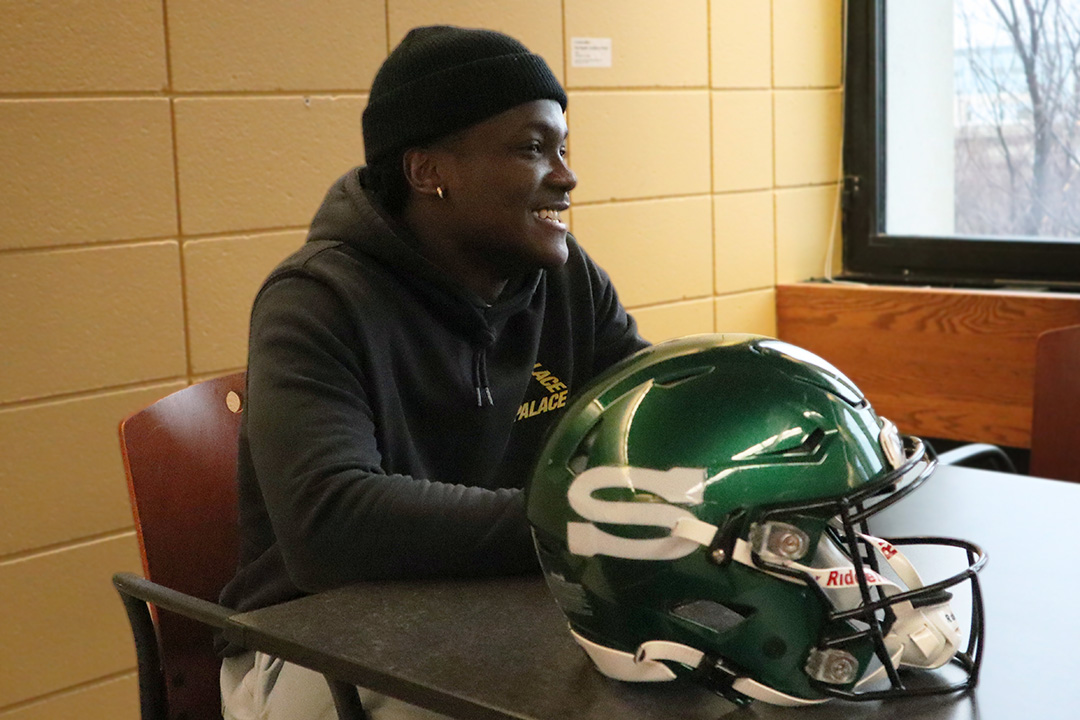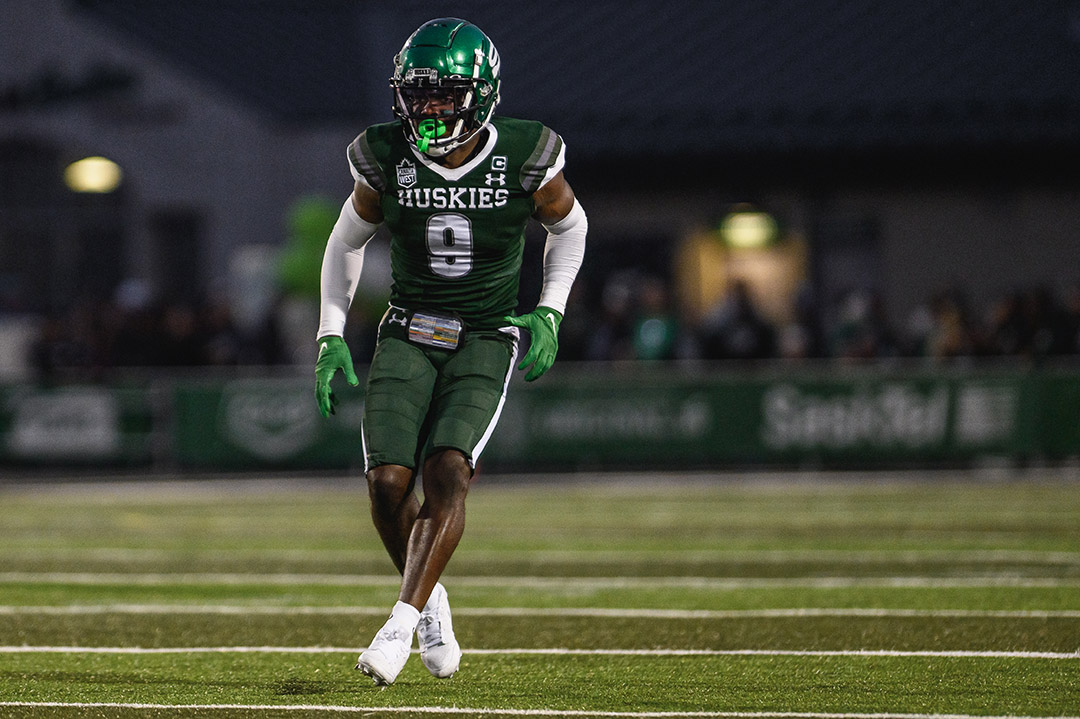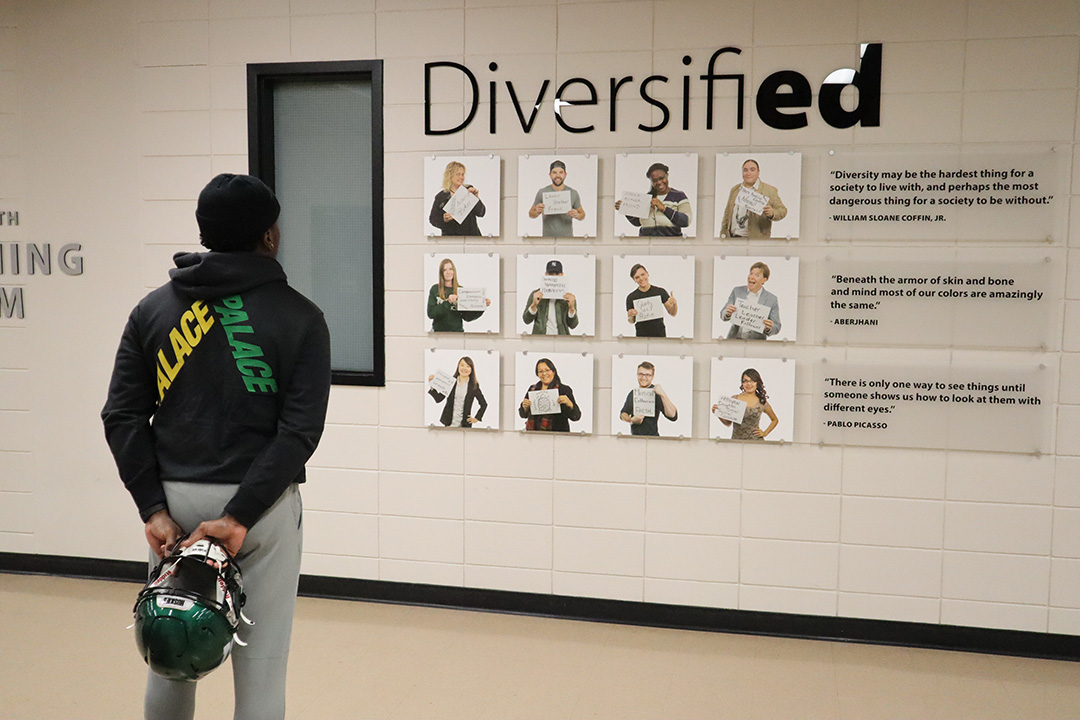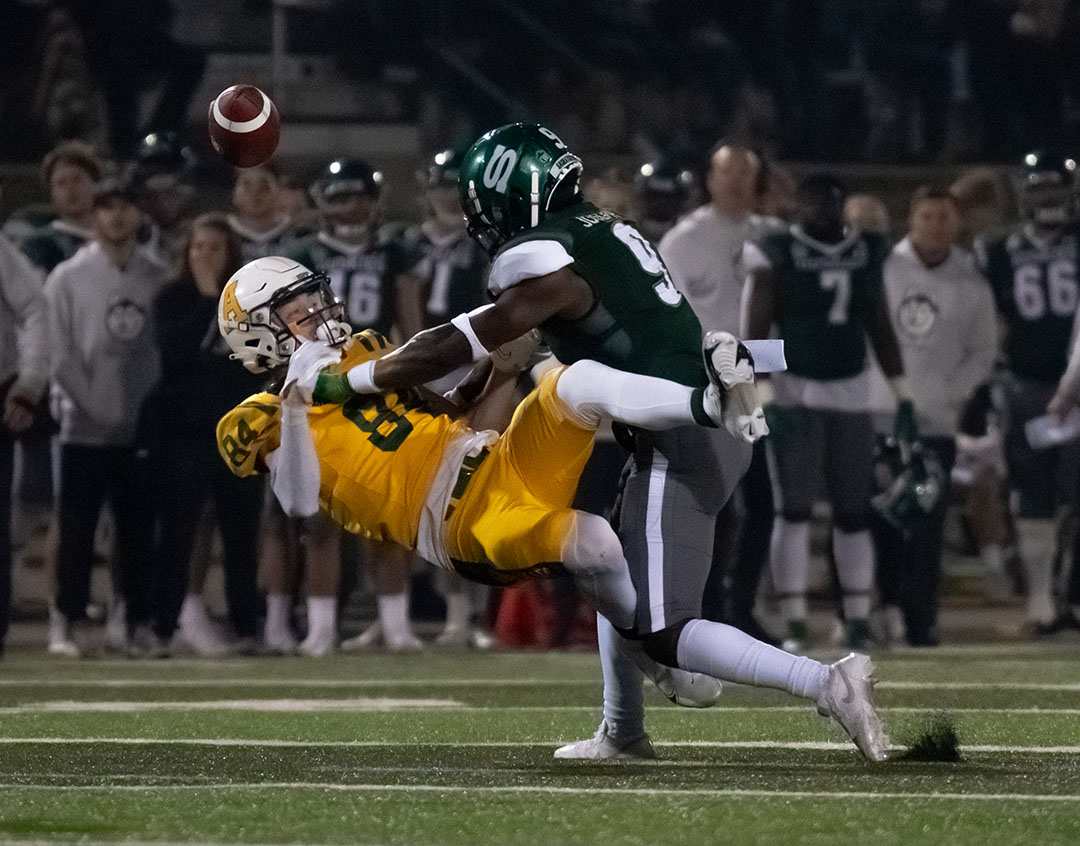
Black History Month at USask: Changing the game
As a University of Saskatchewan (USask) Huskie’s Football defensive back, Katley Joseph is used to making game-altering plays on the field. Now, he’s using his platform off the field so that other black student-athletes may do the same.
By Connor JayJoseph, a master’s student in the Department of Educational Foundations at USask’s College of Education, is researching how Black student-athletes are being racialized in Canada.
Joseph’s first experience playing football was in Ottawa. He grew up playing recreational football with friends in his culturally diverse neighbourhood. As he grew a deeper passion for the sport, his mom signed him up to play in an organized youth league. At his first practice with the Orleans Bengals, he noticed how different his teammates looked compared to his neighborhood friends.

“I’m looking to my right, looking to my left, and I’m one of the few Black kids,” recalled Joseph. “That was a culture shock for me. Families from my neighbourhood usually couldn’t spend that much money for their kids to play. Even though my parents didn’t really have the money for the fees, they found a way for me to play.”
A shy kid growing up, he used football to break out of his shell and build character. In reflection, Joseph also recognized that he began to adjust his speech and expression and act a certain way when he was with his white teammates and coaches.
“I was trying to fit in, but that meant I couldn’t be myself,” Joseph said. “For a while I was like, ‘Oh, is that how you're supposed to act when you're around people that come from different backgrounds than you or don't resemble you.’ Football helped me break out of that shyness but at the same time, early on, I was trying to figure out who I was. I didn’t feel uncomfortable, but I felt reserved and couldn’t show my real personality.”
Joseph, with his quick, fast, and athletic skill set, made football a larger part of his identity. As he learned more about the game, people started mentioning how far he could go in the sport.
“Early on I would hear my coaches, teammates and even some parents tell me I could play football at the professional level. That’s when the dream and reality to focus on football started,” said Joseph.
With football taking priority, the term “student-athlete” took on a different meaning than his white teammates. His first high school was a sports-specialized institution that was predominantly attended by non-white students. When it came to academics, Joseph’s coaches never prioritized his grades as they were more focused on the steps he needed to take to play at the professional level.
“When I was struggling at my first high school, the focus was still football with the coaches,” he said. “Early on, coaches would ask about how school was but never verified my grades. This made me think that the route of becoming a professional athlete didn’t include the need to push myself to succeed academically. I believe coaches must go to extra lengths to make sure their athletes are prevailing on and off the field.”
When looking back, Joseph realized he didn’t reach his full potential in his high school classes. He was content with getting by as opposed to striving for academic excellence. He didn’t push himself the same way in his studies as he did on the field. Since he was a Black student-athlete, no one within the school felt the need to focus more on his academics either.
“My academic advisor at my first high school was a white lady who had a knack for stereotyping Black athletes,” said Joseph. “She told me, ‘You’re not smart enough for university.’ She was probably thinking I was just another Black kid with a dream. But when a white student would need advising, she would show which classes would lead them to go to a certain university. And if this student was struggling, the school would find ways to keep them in the classes they needed.”
He would end up moving to another high school to receive his diploma. He credits the inclusive culture from the school’s teaching and administrative staff.
“At my second high school, which was predominately attended by white students, I never felt an ounce of discrimination. I felt supported from the very first day I started there.”

Joseph credits his three older brothers and coaches Jean Guillaume and Marcus Allen for showing him how to succeed in the classroom and on the gridiron.
“These men were influential Black male figures who taught me how to understand who I am as a person, the role that my skin tone plays and how I can rise above adversity.”
After representing Football Canada (2017) and playing for the University of Maine (2018-2021), Joseph found his way to USask and the Huskie football team. A U Sports Academic All-Canadian and Defensive All-Canadian, Joseph praises Head Coach Scott Flory and the Huskies’ team for taking a chance on him.
“Being in Saskatchewan made me fall in love with football again,” said Joseph. “At one point, because I was injured and wasn’t playing, I had doubts about continuing to play football. Coach Allen suggested for me to transfer to the University of Saskatchewan to continue my education in a master’s program and continue playing football. I’m now on a team with a great group of guys, great coaches, and people that believe in me and want to see team success.”
Joseph found a pathway to his Master of Education thesis topic through anti-racist education classes taught by Dr. Carmen Gillies (PhD). Under the supervision of Dr. Gillies, Joseph is researching how Black high school athletes experience racism.
“I realized that a lot of my Black friends that played football had similar experiences. I’m trying to understand exactly why [academic accountability] is lower for Black student-athletes and how that narrative can be changed. I want to find out why the system is like this and what are some solutions,” explained Joseph.
Guillaume, his former coach, was the mentor who influenced Joseph to pursue a master’s degree.
“There were other figures in my family that had completed a master’s degree or a PhD like my godmother Florence Janvier (PhD in Toxicology and Risk Assessment in Public Health) and god aunt Marie-Ange Janvier (PhD in Biomedical Engineering),” said Joseph. “Coach Guillaume was someone that was a black athlete who also had a master’s degree. I had never seen that. My goal since high school was to not only to make a division one football team, but to also receive a master’s degree.”
Joseph recognizes the importance of setting a framework so that future Black student-athletes don’t experience the overt and implicit racism he did. A place that coaches and teachers can start is by being conscious of what they are telling Black student-athletes.

“Don’t tell the student-athlete they can just make it to professional sports. Tell them the probability of making it professional. At the end of the day, playing professional football is a temporary career. Set them up for life beyond sports. Different wording will help the student-athlete emphasize academics more,” shared Joseph.
As Joseph looks to use his platform for future generations, he encourages his fellow Huskie student-athletes to do the same.
“Sports has the ability to bring unity because people from different and diverse backgrounds come together,” he said. “You’re more than an athlete, I think that’s the most important thing. Don't shy away from certain topics because you think people might look at you differently. If anything, people will see what you stand for.”
“In my case, I don’t shy away from talking about Black student-athletes because I know there are other people that have had similar experiences or there are people who aren’t even aware of what’s going on. I feel like I can touch on these topics confidently and help explain the problems, but also try to find the solutions,” added Joseph.
Whenever Joseph decides to hang up his helmet and shoulder pads, he is confident that his biggest plays are still to come.
Together we will support and inspire students to succeed. We invite you to join by supporting current and future students' needs at USask.
Article re-posted on .
View original article.

